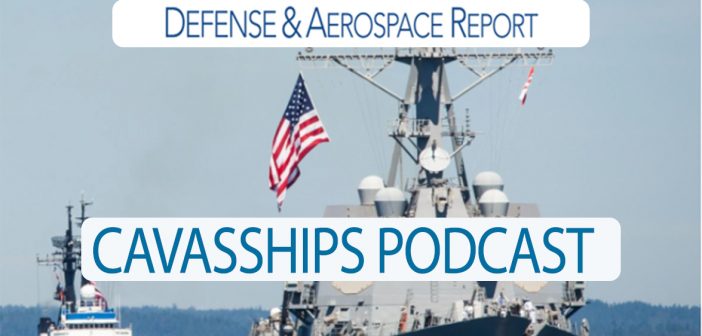Welcome to the CavasShips Podcast with Christopher P. Cavas and Chris Servello…a weekly podcast looking at naval and maritime events and issues of the day – in the US, across the seas and around the world. This week… Houthi attacks on shipping have suddenly become much more accurate, with at least a half dozen merchant ships being struck by missiles or drones in recent days. Two leading experts on merchant shipping – Sal Mercogliano and John Konrad – are back to discuss.
Please send us feedback by DM’ing @CavasShips or @CSSProvision or you can email chriscavas@gmail.com or cservello@defaeroreport.com.
This Week’s Naval News:
In the Red Sea, the Greek-owned bulk cargo ship TUTOR apparently sank June 19, two days after being hit by a Houthi unmanned explosive boat. It is the first successful Houthi unmanned surface vessel attack and the second time a merchant ship has been sunk by the Houthis in the Red Sea. Houthi attacks against merchant shipping continued in the past week in the Red Sea and Gulf of Aden – since June 15, Houthis hit the Ukrainian-owned bulker VERBENA with cruise missiles, and US Central Command reported that, between June 17 and 20, its forces attacked Houthi shore-based radars and destroyed multiple unmanned aircraft and surface craft. On June 19, the head of the European Union’s effort in the region to protect merchant ships said the four-ship force currently deployed to the region needs to more than double in size to fend off Houthi attacks. We’ll have much more on this situation in our discussion, coming up in a few moments.
The ongoing standoff between China and the Philippines in the South China Sea took an even darker turn this week when Chinese personnel from more than eight motorboats rammed and boarded two Philippine Navy small craft June 17 near the disputed Second Thomas Shoal. After a scuffle, the Chinese damaged the Philippine boats, seized weapons and wounded a number of Filipino personnel. Despite the Chinese interference, the Filipino Navy was able to resupply its outpost aboard the SIERRA MADRE, an 80-year-old ship permanently grounded on the shoal.
In shipbuilding news, Philly Shipyard, a Norwegian-owned commercial yard operating on leased property in the former Philadelphia Naval Shipyard, announced June 20 it was entering into a share-purchase agreement with the South Korean defense conglomerate Hanwha Systems and its shipbuilding subsidiary Hanwha Ocean. The deal, reportedly is worth about $100 million, has not yet been finalized and is pending several regulatory approvals. Philly Ship has built several US-owned commercial cargo ships for Jones Act trading between U.S. ports and is in the midst of building several National Security Multi-Mission training vessels for the US Maritime Administration. Navy Secretary Carlos Del Toro hailed the move, calling it, quote, “a game-changing milestone.”
In new ship news, the future US Navy towing, salvage and rescue tug T-ATS 14 will be named NARRAGANSETT, Navy Secretary Carlos Del Toro announced June 18. The name perpetuates a traditional name for US Navy tugs. And on June 20 Austal USA announced construction had begun on the JAMES D FAIRBANKS, T-ATS 13, at its yard in Mobile, Alabama.
And the future frigate FFG 67 will be named GALVEZ, Secretary Del Toro announced June 21. The name honors Conde Bernardo de Gálvez y Madrid and his service during the American Revolutionary War. Galvez provided support to the American Colonies and also fought against the British. This will be the first U.S. Navy vessel named for Gálvez.
And in old ship news, the battleship NEW JERSEY was returned to its permanent mooring at Camden, New Jersey June 20 after a drydocking overhaul in Philadelphia. The battleship is to reopen to the public in time for the July 4 holiday.
Cavas Squawk:
You’ve just heard a pretty wide-ranging discussion about the application of seapower, one of the primary goals of which is the guarantee of free and open international trade on a global basis. At the moment that trading system is being disrupted because of the ongoing security threat in the Red Sea, one of the four or five major shipping choke points around the world. Land power rarely guarantees the safety of those choke points, and airpower can only go so far. In the end, it is seapower – most pointedly displayed by the presence of warships – that can keep these major seaways open and prevent further worldwide calamities.
But no one can go it alone. The US-sponsored Operation Prosperity Guardian, launched in December to protect against Houthi attacks, did not – for a variety of mostly political reasons – meet with widespread support, and it remains largely a US-United Kingdom effort. Other nations, notably France, launched their own escort efforts but confined them to escorting French-owned or operated ships. The European Union has, at the moment, a four-ship effort in the region, and most significant NATO seapowers have been contributing to the effort. Other independent naval efforts, including those of India, Japan and South Korea, also are in the region. But the Houthi threat persists and is growing. Absent several major changes in national policy and will, it is unlikely any effort beyond what we’re seeing is going to take place. For the time being, it’s up to the various navies to deal with the threat as best as they can.
As we noted in the discussion, this extended security situation is one that no one included in their planning operations as recently as eight months ago. Naval planners routinely develop contingency plans, but those strategies are always limited by resources, and those limitations are very much on display.
All this serves as another reminder that plan all you want, events will continue to transpire that were not fully foreseen. The US Navy, by itself, is currently struggling to support major efforts in the Western Pacific, the European Theatre, and now – again – in the Mideast, even under an increased focus to take better care of the ships it has. And all this without a major shooting war going on. Absent a national acceptance of the need for a larger navy and much better support for all that that entails, these challenges are not going anywhere.




